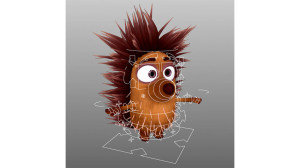With ‘Henry,’ a cinematic leap into world of virtual reality
 On a recent afternoon in sparsely chic offices here, the people making the virtual-reality animated short "Henry" convened to watch footage of their cutting-edge film.
On a recent afternoon in sparsely chic offices here, the people making the virtual-reality animated short "Henry" convened to watch footage of their cutting-edge film.
The group of about a dozen — mostly young and many of them with Pixar backgrounds — gathered in a semicircle as the director, a gregarious filmmaker named Ramiro Lopez Dau, engaged in what appeared to be a tribal ritual. He dropped to the floor, strapped on a headset and began crawling around an area rug, extending his head this way and that in the manner of a disoriented cat.
A heartfelt piece of animation that would fit nicely on any Pixar slate, "Henry" is notable as much for what it isn't as what it is. VR content to date has mostly steered clear of traditional narrative — it's tended instead to be a marketing offshoot of a studio movie, a snippet of live-event footage or a branded "experience" mainly designed to produce a sensation in the viewer. Or it's been a video game.
"Henry," on the other hand, tells a clear story with a conventional beginning, middle and payoff-y end. The difference is that it does so in the new medium of virtual reality. Rather than see a traditional frame, the headset-clad viewer occupies the entire space, able to swivel his or her head all the way around and see every corner of the world, as in real life.
"A lot of comedy in animated movies, like slapstick, is actually based on sad things — you know, someone falls on their face or gets a bad break," said Story Studio Chief Saschka Unseld. "When that sad thing happens in a traditional film, it can be funny, because there's some distance. But when you have as much empathy as you do in a VR film, it can be super sad."
"The experience of going from Pixar to making this film is really similar to moving from Germany to the U.S.," he said. "In the beginning, you miss all the stuff you used to have — in the case of filmmaking, the camera editing and everything else. And then once you start living somewhere else, you find things you never had before and begin to embrace them."
"In VR, we're learning you don't need a character to do as much to be interesting."
The effect is paradoxical. Digital culture is making everything move faster as it begins to match the speed of real time. But this technology is becoming so lifelike that it now has to slow down again.
(A similar dynamic, incidentally, is at work with how a character moves in VR. The conventional wisdom has been that, without the edits of traditional filmmaking, you can't go from one place to another in the bat of an eye. The truth is, you can--technically. But when "Henry" filmmakers tried it, putting Henry in one part of the house and then quickly in another, they realized it looked like teleportation. They quickly scrapped it.)
Part of why virtual reality feels so different is because viewers themselves can move — certainly with their heads and, within limits, their bodies, walking or crawling toward various spots of an environment. That has a kind of democratizing effect, turning film from its long-held status as a director's medium, with well-curated shots, to something looser and more participatory.
short video here: https://vimeo.com/134754691?utm_source=VR+Digest&utm_campaign=75337a97f4-VR_Digest&utm_medium=email&utm_term=0_54068a0706-75337a97f4-74843441
Pages
- About Philip Lelyveld
- Mark and Addie Lelyveld Biographies
- Presentations and articles
- Tufts Alumni Bio